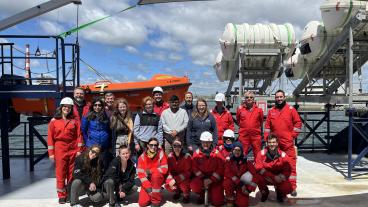Payne Institute for Public Policy 2024 State of Critical Minerals Report highlights potential of mining tailings and steep nickel cost curve
New legislation and U.S. government’s significant investments are also spotlighted

A new critical minerals report from The Payne Institute for Public Policy at Colorado School of Mines highlights the vast potential from mining tailings, the steep cost curve for Nickel, new legislation focused on increasing the domestic mining of critical minerals and the U.S. government’s recent $4.9 billion of investments in mining and processing.
The 2024 State of Critical Minerals Report marks the second year the Payne Institute has produced this analysis. Building on last year’s report, which provided a comprehensive overview of the supply, demand, technical and political landscape for critical minerals globally, this year’s edition targets the U.S. federal response, while also examining dynamics that will impact the mining industry’s ability to meet the needs for critical minerals that are presented by the global energy transition.
The report can be accessed here.
Some key takeaways from the report include:
- Mining tailings, which are produced at a rate of 12.7 billion tons per year and are held at ~30,000 sites globally, represent a tremendous source of critical minerals. These minerals can be made accessible through legislation releasing liability as well as new technologies and processing techniques.
- Proprietary analysis by the Payne Institute highlights that nickel’s “cost curve” is four times steeper than cobalt. As electric vehicle fleets grow worldwide, this varying cost of availability of key minerals can impact clean-energy technology adoption.
- Since 2021, there have been 17 bills passed or introduced in U.S. Congress dedicated to promoting domestic critical mineral mining. This includes bipartisan legislation introduced last month by Senators John Hickenlooper (CO) and Thom Tillis (NC) that calls for a coordinating body and innovation support.
- The bills include support to boost mining engineering education. The U.S. currently confers 160 mining undergraduate degrees per year vs. 2,500-3,000 in China.
- There is increasing attention, including within proposed legislation, on appropriate engagement with the 574 federally recognized Native Nations in the U.S. related to efforts to rejuvenate U.S. mining development.
- From the beginning of 2021 through the first quarter of 2024, federal government agencies announced $4.9 billion in project-specific financial support for mining and processing development.
“It is clear that the only viable path to mining development in the U.S. requires a dual focus on innovative technologies and techniques and engagement with communities, Tribes and wider society,” said Morgan Bazilian, Director of the Payne Institute. “This year’s State of Critical Minerals report considers the many steps being considered to address both fronts. It also highlights the leading research and workforce development being done by the extraordinary, interdisciplinary teams at the Colorado School of Mines.”
About the Payne Institute for Public Policy
The mission of the Payne Institute is to provide world-class scientific insights, helping to inform and shape public policy on earth resources, energy, and environment. The Institute seeks to link the strong scientific and engineering research and expertise at Mines with issues related to public policy and national security. For more information, visit: payneinstitute.mines.edu.
About Colorado School of Mines
Colorado School of Mines is a public R1 research university focused on applied science and engineering, producing the talent, knowledge and innovations to serve industry and benefit society – all to create a more prosperous future. Learn more at mines.edu.




